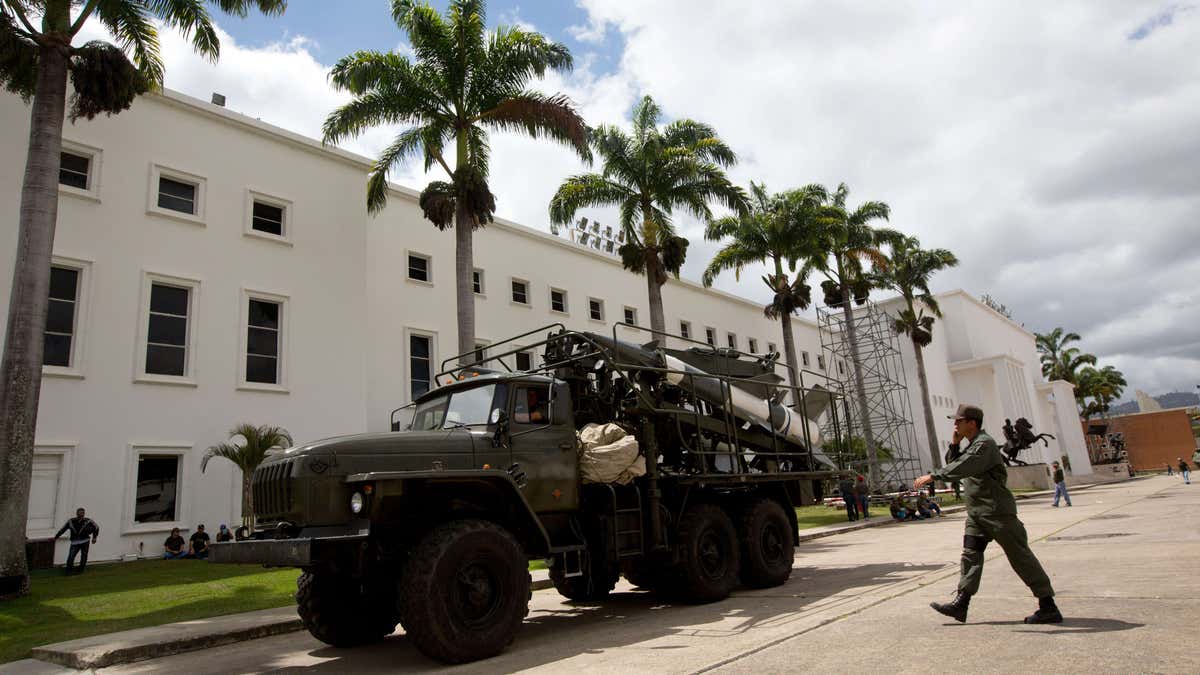
March 14, 2015: A Venezuelan army soldier walks next to a missile system launcher prior starting a civilian and military exercises at fort Tiuna in Caracas, Venezuela. (AP)
Soldiers rolled out shoulder-fired missiles, fighter planes and armored trucks Saturday for the first of 10 days of military exercises that the president of socialist-governed Venezuela says are needed to protect against a looming threat from the U.S.
As nearly 100,000 members of the armed forces began conducting exercises across the country, Venezuela's government got support from South American nations, which criticized the U.S. for the way it imposed sanctions on Venezuelan leaders.
Washington imposed the sanctions earlier this week on several Venezuelan officials accused of human rights violations and declared the country a threat to U.S. national security, a formality that generally precedes declarations of sanctions. President Nicolas Maduro said he would take steps to protect Venezuela from a hostile U.S. government.
Defense Minister Vladimir Padrino Lopez inaugurated the exercises at Fort Tiuna in Caracas, the largest military installation in Venezuela. He said U.S. sanctions constitute "an imminent danger for us" and the armed forces must ready themselves to ensure the country's independence.
In a nationally broadcast talk Saturday night, Maduro praised the skills shown by the armed forces on the first day of the exercises, saying that "we have a military that is the best guarantee of peace."
If ever, he added, "the insolent boot of imperialism dared touch the sacred land of Venezuela, that day if we had to fight for the dignity of our country, we would do it for peace and for the sovereignty and the integrity" of the country.
The U.S. has denied Maduro's claim that it is seeking to undermine his government and urged him to focus on Venezuela's domestic problems.
Venezuelan sailors performed drills in the Caribbean while soldiers defended the oil-producing country's biggest refinery from a simulated attack. Thousands of civilians wearing the red shirts of the socialist revolution started by the late President Hugo Chavez 15 years ago paraded in a complementary exercise.
Also on Saturday, the 12-nation South American bloc UNASUR rejected the U.S.'s classification of Venezuela as a threat. Representatives met privately in Ecuador to review the situation in Venezuela and the recent U.S. crackdown.
Regional leaders from Cuba, Bolivia and Ecuador had already criticized Washington's actions this week, which even some members of Venezuelan opposition groups have said were inappropriate.
Last week, UNASUR sent a delegation of foreign ministers to Caracas to assess the situation in Venezuela, which has wide political divisions amid severe economic problems. The main outcome of the visit was a promise to help the country alleviate food shortages.
Opposition leaders in Venezuela expressed doubt about the utility of the UNASUR meeting and called the military exercises an embossment, saying they underlined the increasing crackdown on dissent in a country where several political leaders have been jailed. A police officer was recently arrested for killing a 14-year-old at an anti-government protest.








































